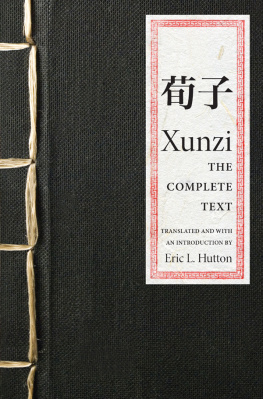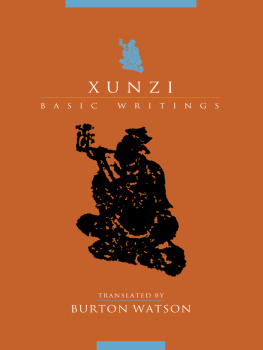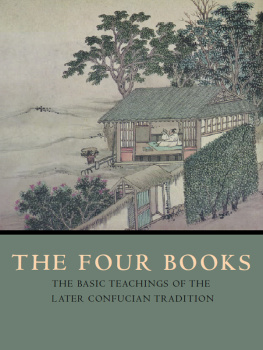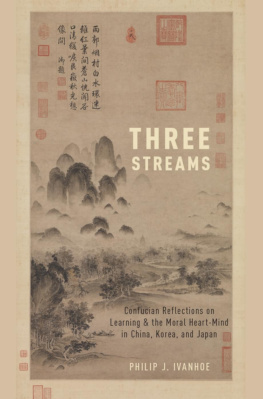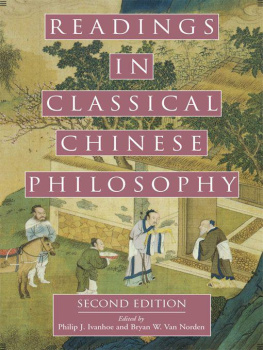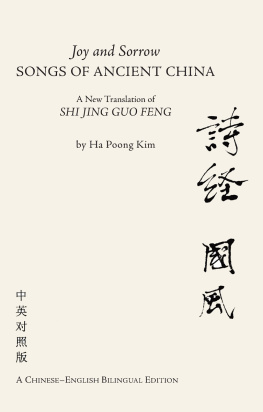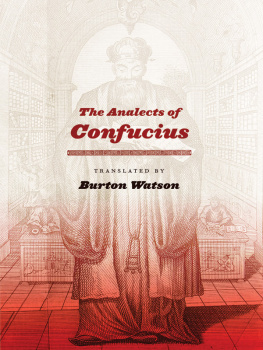
Xunzi
Xunzi
THE COMPLETE TEXT
T RANSLATED AND WITH AN I NTRODUCTION BY
Eric L. Hutton
P RINCETON U NIVERSITY P RESS
P RINCETON AND O XFORD
Copyright 2014 by Princeton University Press
Published by Princeton University Press, 41 William Street, Princeton, New Jersey 08540
In the United Kingdom: Princeton University Press, 6 Oxford Street, Woodstock, Oxfordshire OX20 1TW
press.princeton.edu
Traditional hand-bound book Eric Von Seggern/Shutterstock.
Jacket design by Carmina Alvarez.
All Rights Reserved
ISBN 978-0-691-16104-4
Library of Congress Control Number: 2014933937
British Library Cataloging-in-Publication Data is available
This book has been composed in Baskerille 10 Pro
Printed on acid-free paper.
Printed in the United States of America
1 3 5 7 9 10 8 6 4 2
When the disciple has achieved success and profit, then he gratefully thinks of his teacher.
Xunzi, chap. 14
This book is dedicated to P. J. Ivanhoe, my mentor and friend.
A CKNOWLEDGMENTS
I began this translation project in 1996. Over the eighteen years that I have worked on it, it has benefited from the insights and suggestions of a tremendous number of people, including my teachers, students, classmates, colleagues, friends, and fellow scholars. I hereby most gratefully acknowledge their help and hope that they will be pleased with the final product.
I would like to extend special recognition to the following individuals and institutions. Early on, significant portions of this work were published as part of Readings in Classical Chinese Philosophy (Hackett, 2003), and the manuscript was greatly improved by comments from the editors, Bryan Van Norden and P. J. Ivanhoe. In the time since then, P. J. has also given me invaluable feedback on every portion of this text, and to him I owe gratitude beyond all words. At points along the way, I have spent many enjoyable hours dissecting the Chinese text in the company of Jack Kline, Michael Nylan, Huichieh Loy, and Eirik Harris, hours that have contributed immensely to my understanding of the Xunzi and to this translation. Also, discussions with Aaron Stalnaker, Miranda Brown, David Elstein, Eric Schwitzgebel, Mark Csikszentmihalyi, Ted Slingerland, Justin Tiwald, Erin Cline, and Bryan Van Norden have likewise enriched this work. When a substantial portion of the translation had been completed, Gordon Mower read through the lengthy draft and identified many places where it could be improved. In 2008, Stephen Angle and Michael Slote used selected chapters from the manuscript in their NEH summer seminar on Confucianism and contemporary virtue ethics, and I received very helpful suggestions from them and the seminar participants. During the 200910 academic year, I was able to make significant progress toward finishing the manuscript thanks to support from the University of Utah in the form of a Virgil C. Aldrich Research Fellowship from the Tanner Humanities Center and a Faculty Fellow Award from the University Research Committee.
I also wish to express my gratitude to a number of people involved in the last stages leading to this publication. In particular, I thank Rob Tempio at Princeton University Press for his tremendous support, as well as three anonymous reviewers for the press who offered encouraging and helpful feedback. Deborah Mower and Rochelle Beiersdorfer enthusiastically advocated for this translation, which I appreciated very much. I visited Berkeley in the summer of 2013, and Mark Csikszentmihalyi provided some crucial research assistance during that period. Toni Lee Capossela read through the whole manuscript and offered many suggestions that have made it more readable. To Deborah Wilkes at Hackett Publishing I am likewise indebted for her invaluable assistance with matters of copyright and other technical issues concerning publishing.
Finally, I would like to thank my mother for nurturing me and encouraging my scholarly endeavors from the time I was a child to the present. I would also like to thank my wife, Sophia, for her love and patient support during the many years over which this project was completed.
I NTRODUCTION
Without a doubt, the Xunzi is one of the most philosophically interesting and sophisticated texts in the Confucian tradition. It covers a wide variety of topicseducation, ritual, music, language, psychology, history, religion, ethics, politics, and warfare, to name just a fewand it provides quite thoughtful treatments of all these subjects. Indeed, despite being a very old text, many of its insights still ring true in the present. It is thus a text that amply rewards study, and not only for those seeking to understand ancient Chinese views in particular, but also for anyone reflecting on these important aspects of human life in general.
T HE P URPOSE AND F EATURES OF T HIS T RANSLATION
Although the Xunzi is a very rich text, study of the Xunzi was relatively neglected for many centuries in China, due in large part to the greater popularity of another early Confucian text with rival ideas, the Mencius (also called the Mengzi). As a result, the Xunzi was initially also rather neglected by many Western students of Chinese thought. Fortunately, this situation is slowly being rectified, and study of the Xunzi has begun to flourish again both inside and outside China in recent years. Nevertheless, the evidence of long neglect is still apparent in various ways, one of which is that there was no complete English translation of the Xunzi available before the work of John Knoblock appeared during the years 198894. Since one of the most important means for promoting the study of Chinese thought in the West is by making primary sources available to readers through translations, this was a major step forward for the field.
Yet, while Knoblock has undeniably made a great contribution to study of the Xunzi, in various ways his translation is not well suited for use in teaching undergraduates. For one thing, he provides a tremendous amount of explanatory material and endnotes that far exceed the needs of the typical undergraduate reader, which makes his translation a massive work and contributed to its being unfortunately priced well beyond what is reasonable for textbook adoptions. (Moreover, at the time of writing this, the original version has gone out of print. A bilingual reprint from mainland China is currently available for purchase, but is still quite expensive and omits all of Knoblocks explanatory material and endnotes, thereby leaving students with no aids whatsoever for understanding the more difficult parts of the text.) Also, in striving to be precise and literal, Knoblock produced prose that is frequently difficult to follow for undergraduate readers. More seriously, there are some substantial inaccuracies and technical flaws in the translation that have been pointed out in published reviews of it, which I will not rehearse here.
As an alternative to using Knoblocks translation for teaching undergraduates, there exists a widely available, older translation of the Xunzi by Burton Watson, which is often more readable and more accurate and has been priced more affordably than Knoblocks work. It is thus better suited to serve the needs of the undergraduate classroom, and hence has continued to be the preferred edition for many instructors, even after the appearance of Knoblocks translation. Yet, because Watsons translation is abridged, it omits many chapters that are both historically and philosophically very significant, and which can markedly impact ones interpretation of the text. Instructors teaching from Watsons text but wishing to cover parts of the
Next page
